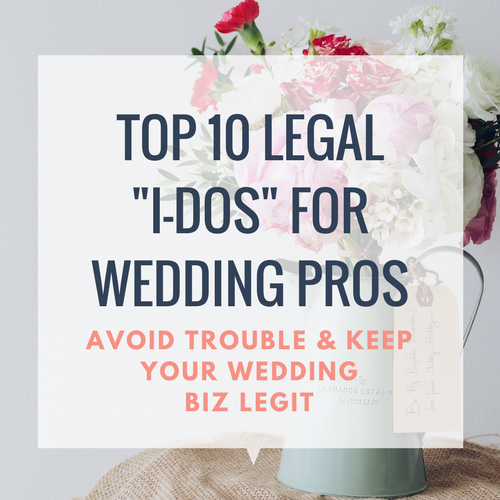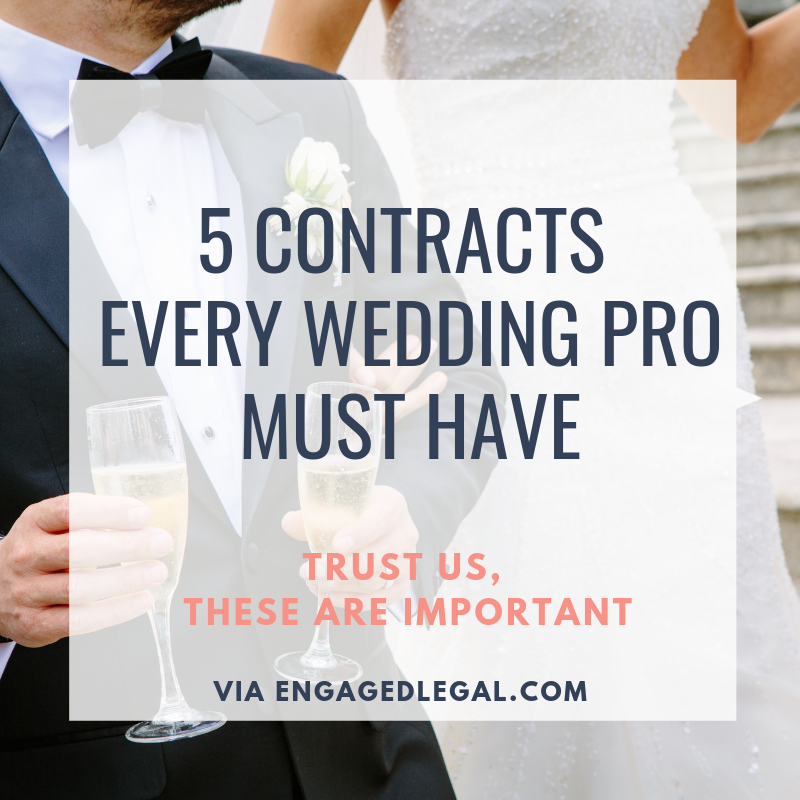How to Legally Start a Wedding Planning Business
/Congratulations on embarking on this exciting journey into the world of wedding and event planning!
Before you dive into selling your services and making wedding dreams come true, let's talk about the nitty-gritty of starting your business on the right foot—legally speaking.
Here, we’ll outline the basic steps to start your wedding planning business legally— and I promise, it won’t be painful!
1. Choose a Business Structure
The first step in starting a business is to choose a business structure.
The most common business structures are sole proprietorship, partnership, limited liability company (LLC), and corporation.
Each business structure has its own advantages and disadvantages, and the choice depends on the type of business you want to start, the number of owners, and the level of liability you're willing to take on.
I typically push wedding and event planners towards LLCs, because (i) they shield owners from personal liability, and (ii) they are simple to maintain.
You can also elect to be taxed as a corporation to save on self employment taxes. That’s something to discuss with a CPA, but it’s called “making an S-Corp Election.” Note that you aren’t changing your business entity structure, you’re just making a TAX election. That trips people up.
2. Choose/ Clear your business name
Choosing a business name is one of the most important decisions you will make when starting a business. Your business name is how your customers will identify your brand, and it can also impact your marketing efforts, search engine optimization (SEO), and even your legal rights.
Before using a business name, it's important to check its availability not just on social media platforms, but in relation to trademarks. You can do this by conducting a trademark clearance search, which helps you determine whether the name is already registered as a trademark and/ or if it is available for use.
A trademark is a symbol, design, word, or phrase that is used to identify and distinguish the goods or services of one company from those of another. (note: Click HERE for an article about trademarks for wedding pros!) Trademarks are valuable assets that help build brand recognition and loyalty. Registering a trademark provides legal protection for your brand identity and prevents others from using a similar name or logo in your industry.
A trademark clearance search is important because it helps you avoid potential legal issues and costly disputes with other businesses that have already established trademarks in the wedding and event industry. If you choose a trademark that is too similar to an existing trademark, you may be sued for trademark infringement, which can result in legal fees, damages, loss of social media handles, and required rebrands.
The WORST thing about my job is telling people with big brands and large followings that they have to rebrand because of a trademark issue!
You can conduct a trademark clearance search on the United States Patent and Trademark Office (USPTO) website or by hiring a trademark attorney to conduct a comprehensive search.
3. Register Your Business with Government
Once you have chosen a business structure, the next step is to register your business. This involves registering your business name with:
your state government,
obtaining a federal tax identification number (EIN) from the Internal Revenue Service (IRS),
obtaining a state tax identification number,
registering for a business license with your locality, if required, and
obtaining any required licenses and permits. The specific licenses and permits you need depend on the type of business you are starting and the state and local regulations in your area, but typically, we’re going to be looking at things like zoning compliance or health and safety permits.
File your BOI with FinCEN (new requirement as of 2024!)
4. Obtain Business Insurance
While registering as a limited liability company or corporation limits an owners personal liability, it's also important to protect your business from liability by obtaining business insurance.
Depending on your business structure and the type of business you are starting, you may need different types of insurance, such as general liability insurance, professional liability insurance, errors and omissions insurance, or workers' compensation insurance. The best thing to do is ask fellow event vendors who they use, and consult with that insurance agent to determine appropriate coverage.
5. Open a Business Bank Account
One of the most important things required to keep your liability limited: do not comingle funds. “Comingling Funds” means mixing personal and business finances. With any sort of business entity, but especially limited liability entities, you need to separate your finances.
The easiest way to separate your personal finances from your business finances is by maintaining a business bank account. This will make it easier to track your income and expenses, and it will also make tax time less stressful. You’ll put all incoming funds into the business bank account, and “pay yourself” (which can be as simple as transferring money from one account to another) by moving money into your personal account.
You’ll also need to set up a system for tracking income and expenses, and keep all receipts and invoices. You may want to consult with an accountant or bookkeeper to ensure that you're meeting all tax requirements and keeping accurate records.
TL;DR: Never pay personal expenses directly from your business account. Always move money into a personal account first.
6. Put Proper Contracts in Place
Wedding planners live and die by your contracts.
Contracts are legally binding agreements between two or more parties that outline the terms and conditions of a business transaction. Contracts are important because they:
Clarify Expectations: Contracts help memorialize the expectations of both parties involved in a business transaction. The contract should state the details of what is being exchanged, when it will be exchanged, where the services will take place, what services are provided, how much the client is going to pay, and what happens in a “worse case scenario.” By outlining the terms and conditions of the agreement, both parties have a clear understanding of what is expected of them and what they can expect from the other party.
Resolve Disputes: Contracts provide legal protection for both parties if something goes off the rails. If there is a dispute between the parties, the contract can be used as a roadmap to resolve the dispute. A good contract provides a clear and enforceable framework for resolving disputes, addresses what happens after a breach of the agreement, and provides an “out” for the harmed party.
Distribute Risk: Contracts help manage risk for businesses. By outlining the risks and responsibilities of each party, a contract can help mitigate the potential for unexpected costs or liabilities, and even shift the risk to the other party. Crazy wedding guests damage the venue or rentals? Contracts can make sure the couple is responsible for paying for that damage, not the wedding planner!
Clauses like indemnification, liability limitation, and force majeure can protect wedding planners when things get a little too wild. Shameless plug: Our Wedding Planner Contract Template has ALL of this good stuff in there to keep your liability minimized.
Getting the proper contracts in place before you begin providing services is absolutely critical. Make sure you’ve got a thorough, well drafted contract in place— never go on handshake deals! When documenting your agreements, being specific with deliverable-oriented scopes of work is KEY. So wording like “unlimited communication” should be realistic: “Communication with the client between the hours of 9am and 8pm” is much more action-oriented!
You may also need contracts between you and other vendors. For example, photographers own the copyrights in any photograph they take. so all wedding planners need to ensure they have a contract that permits their commercial use of those photographs (yes, even though you’re the one that made the magic happen in the first place).
***
While starting a business can be an exciting and fulfilling journey, it's important to ensure that you are operating legally. It's important to note that the steps to legally start a business may vary depending on the state and type of business, but this general outline should get you headed in the right direction— and make it easier to get moving forward confidently!
We’ve got a lot of contracts that accomplish all this and more in our shop!


















